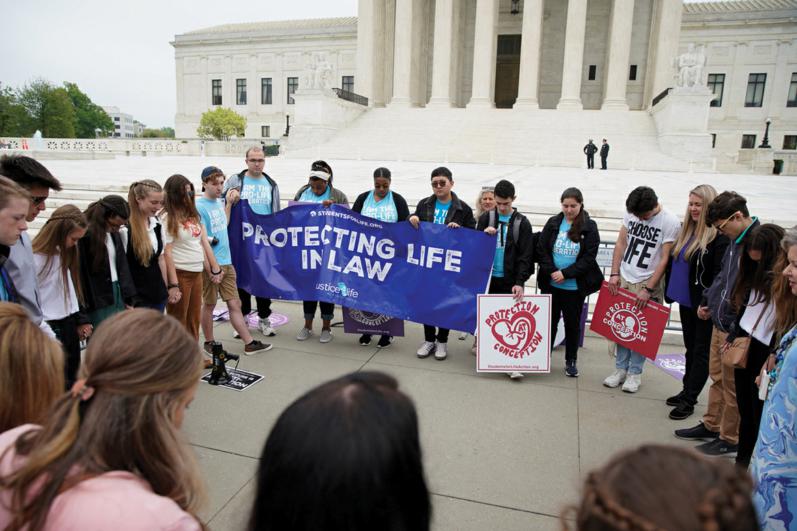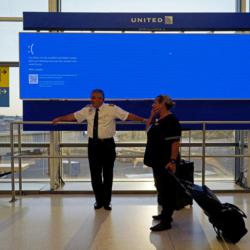Local pro-life advocates react to SCOTUS leak, contemplate post-Roe future
BRAINTREE -- On the evening of May 2, Sonja Morin was on a train bound for Washington, D.C., where she planned to participate in pro-life events with the Progressive Anti-Abortion Uprising (PAAU). But everything shifted when she received a phone call from the group's leader informing her of a change in plans.
The news left Morin stunned: an initial draft of the Supreme Court's majority opinion for Dobbs v. Jackson Women's Health, which is expected to come out in June, had been leaked to the press. The draft indicated the court's intention to overturn Roe v. Wade, the decision that legalized abortion in the United States -- a reversal that pro-life advocates had been working toward for almost 50 years.
"It was a moment of anxious hope. I knew that the draft indicated what could be the end of Roe in my lifetime, something that I'd hoped for from the moment I learned of its existence. But it would take a lot more than that train ride to fully process everything," Morin said.
When J. David Franks, Ph.D., heard the news from various friends texting him, he felt "shock" and "elation." He has been part of the pro-life movement for over 20 years and is the current chairman of Massachusetts Citizens for Life (MCFL).
"To see a real chance that the thing one's been working on so long will come to fruition, it's hard to wrap one's mind around. So, I was definitely just feeling a sense that this was a possible turning point in our nation's adventure in republican democracy," Franks said.
Dwight G. Duncan, a professor at Umass School of Law Dartmouth, recalled witnessing Casey v. Planned Parenthood in 1992, which affirmed the Roe decision. After that, he said, he never thought he would live to see the overturning of Roe.
"It looks like it's going to happen, but 'till it actually comes out, we don't know for sure," Duncan said.
The draft opinion, penned by Justice Samuel Alito, is dated Feb. 10 and has been confirmed as authentic by the Supreme Court. It consists of 98 pages, 32 of which are an appendix of state laws criminalizing abortion.
Franks said the opinion was "cathartic to read."
"What we have wanted to say for decades in response to the shoddiness of Roe and Casey, we find expressed here in argumentation of great cogency. It is worth a look on its own merits," he said.
Morin said that Justice Alito's opinion "exposes the false pretenses upon which the Roe and Doe decisions were based," which have been questioned by both pro-choice and pro-life legal scholars. Doe v. Bolton was the companion case to Roe v. Wade.
The draft opinion counters the argument that overturning Roe would be reversing a well-established precedent.
"The court said basically while the rule of precedent is generally applicable -- the idea that the court should be consistent in its interpretation of the law and the constitution over time -- nonetheless when it comes to an error of constitutional proportions, like Roe v. Wade was, pretty much the only way of rectifying it is to overturn it," Duncan said.
The draft opinion also addresses the fear that overturning Roe would make it possible to reverse other SCOTUS decisions about various freedoms, such as contraception in Griswold v. Connecticut, gay marriage in Obergefell v. Hodges, and interracial marriage in Loving v. Virginia.
"Alito makes the clear distinction that, unlike these other aforementioned cases, the Roe and Doe decisions faced a preeminent ethical question: the morality of taking a life," Morin said.
Duncan said one concern of his is that the public needs to be informed about what Roe v. Wade really entails.
"I think very few of the people who are reacting to this have actually read what's involved," he said.
He dismissed abortion supporters' claims that this decision signifies the end of democracy as "ridiculous."
"Really all this case does is return the issue to the ordinary legislative process and the democratic process," Duncan said.
Following the leak, MCFL was quick to issue a statement about the decision's potential impact. They emphasized that although such a ruling would overturn Roe, it would not outlaw abortion.
"Pro-life supporters and the press need to understand that such a ruling in Dobbs would return the abortion issue to elected representatives in each state legislature. Unfortunately, abortions will continue to be available across the country in many places, including here in Massachusetts. There will be much work left to do to protect our most vulnerable citizens and support women and men faced with unplanned pregnancies," MCFL said in a May 3 press release.
Speaking to The Pilot on May 6, Franks said they recognize the "precarity" of the status of women and girls in society, which is why pro-life advocates do not want to criminalize the mothers who seek or undergo abortions, but rather go after the abortion industry.
"There are complex issues that aren't easily remedied that we have to all be very serious about confronting together as a society. But we just insist, as we always have, that killing is no good solution to complex social problems," Franks said.
He said that pro-life advocates cannot be comfortable doing what they have been doing all along.
"We can't just say pro-life slogans that may be true in fact but they're not going to be useful in convincing those who aren't already convinced. We have to show ourselves vulnerable enough as dialogue partners to learn from others, from their stories, so that we're approaching this question from a position of ever-increasing compassion and insight," Franks said.
He expressed the hope that "in such a performance of civic friendship, the necessity of defending human life, especially in the most vulnerable conditions, will become more generally apparent."
Morin had the chance to see this firsthand after news broke about the opinion. When she arrived in Washington, D.C., she practically ran to the Supreme Court, where she and 18 other pro-life activists spent most of the following week, singing, chanting, and having dialogue with people.
"A few changed their minds on the issue of abortion right in front of our eyes," she said.
But they also encountered fierce and violent opposition from abortion supporters who had come to demonstrate. Some shoved them, threw liquids on them, and stalked them. Morin said some of her companions were groped, one was punched in the face, and she herself suffered hearing damage from having a megaphone at full volume pressed to her head.
"We all carry these proudly; our bruises are nothing in comparison to the outright violence dealt against pre-born children and their parents every single day," Morin said.
She said she anticipates more hostility coming toward the pro-life movement.
"I saw hatred and violence like I'd never seen before in D.C. The same mode repeats in our country as we speak. Pregnancy resource centers and pro-life offices are (being) targeted and attacked," she said on May 11, referring to several incidents of violence and vandalism since May 2.
Morin said she considered it "Divine Providence" that she and other pro-life activists, most of whom were also from out of state, had already been on their way to Washington.
"Had we not been there, the message of violence and oppression would have had full rein over the narrative coming from D.C. How many more people would have been left wounded and scared if that were the case?" she said.
She hopes this moment will be "a call to action" for the pro-life movement, and that pro-life organizations will "passionately defend pregnant, parenting, and pre-born people" when the Dobbs decision is officially handed down.
"The message of abortion violence cannot dominate public discourse. Lives depend on it," she said.


















